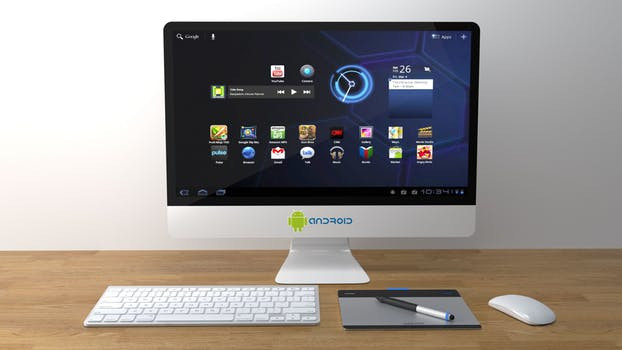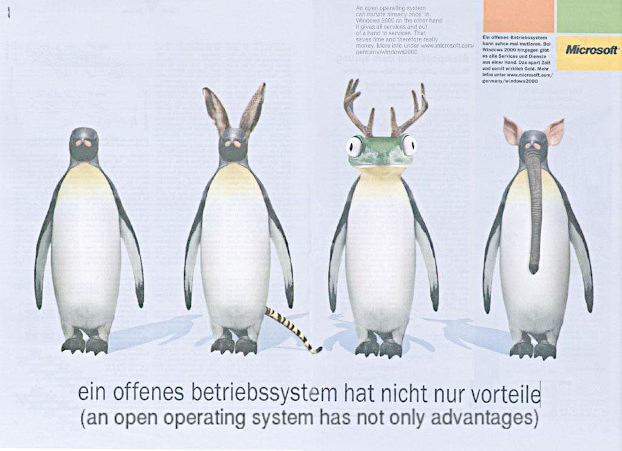jazzy-software - The Blog

About: Operating Systems
“You will own nothing and you will be happy”. In the field of computers and data, Klaus Schwab's word becomes reality.
The operating system is the software that brings a computer to life. It makes drives, folders, files and various devices available. It provides a graphical user interface so that the user can work with tables, images or text and other media. Without an operating system, your device is just a useless box.
In the company and on the desktop or laptop at home, “operating system” is usually synonymous with “Microsoft Windows”.
In principle, the graphical interface is not that different whether you use Windows, Linux/Unix or Apple. Basically, it always consists of a menu from which applications are started, a bar in which you can see your open programs, and windows in which your applications are running. Mouse and keyboard serve as input devices. Everything else is habit.
Microsoft Windows
The myth of the garage from which Bill Gates built his empire persists. In reality, it was his father's money and connections that made his rise possible. The basis for MS-DOS was the CP/M clone 86-DOS from developer Tim Patterson. Bill Gates bought 86-DOS for $75,000, called it MS-DOS, and licensed it to over 70 companies within a year. Without a graphical user interface, it was adapted to the performance of the desktop computers of the time and soon dominated the market.
But the hardware developed rapidly. Microsoft used the MS-DOS crutch to create a graphical interface with windows that could be operated with the mouse. Microsoft Windows was born. However, the mouse and windows were not a Microsoft invention. They have been around for a long time on Unix workstations, but not for the consumer sector.
The MS-DOS crutch lasted until Windows ME; it was only with XP that the NT architecture finally became established.
With Windows 10, Microsoft's concept changed to "Windows as a Service". This meant that the control over the user's computer - and also the data on it - shifted to a large extent to Microsoft. From the perspective of data protection and data security, this is a very worrying development.
Linux
Linux is an evolution of the UNIX operating system. UNIX is practically the grandfather of all computer operating systems. The first graphical user interface with windows and mouse control was developed for UNIX. In addition to Linux, Apple's Mac OS or OS-X and the (Free) BSD systems are direct UNIX derivatives.
Linux has long been the dominant server operating system. There are various distributions, some of which are more or less experimental and focus on using the latest developments and program versions, while others - like Debian - focus on maximum stability.
On a Linux system, there is a strict separation between the operating system and the graphical user interface. The Linux user can choose from a variety of so-called “desktops” that determine the appearance and operation of the interface. The best known are Mate, Cinnamon, Gnome and KDE.

Microsoft placed this ad in 1999. It probably referred to the large number of different Linux distributions, which differ in technical details but not in the user interface.
Unlike Windows, you download programs for your Linux distribution using a so-called package manager. These packages are provided and signed by the developers of a distribution. This largely eliminates the likelihood of installing malware with a program.
Installation on a desktop computer or laptop is no longer a problem with the well-known distributions; they install automatically and work like Windows out of the box. They also offer advantages through their update system, which, unlike Windows, usually does not require a restart. Linux updates run at the same time and you can continue working without worry, there are no waiting times after a restart and errors and security gaps are fixed within a few days, there is no waiting until a "patch day".
However, there are still problems with driver support for printers, scanners and the like. While keyboard, mouse and screen are not a problem, you should pay attention to the existence of Linux drivers when purchasing other devices. This also applies to the graphics card.
OpenBSD, FreeBSD and derivatives
The BSD systems are conceptually similar to Linux, but their technical approach is more like traditional Unix. Software and updates are compiled on the computer from the source code - which runs automatically, remains completely hidden from the user and requires no intervention on their part.
However, it is even more important to pay attention to compatible hardware when purchasing the computer than with Linux. In return you get a stable and very secure operating system.
Apple's OS X is a BSD derivative, but without the benefits of open source code. No different or perhaps even more so than Microsoft, Apple also tries to incapacitate and control the user.
Android
With the development of smartphones, Google began to develop the Linux-based Android as a unified operating system. Today, Android occupies the same place in smartphones as Windows in the PC market. Around 90 percent of smartphones are Android devices.
Android follows Klaus Schwab's call: "You will own nothing and you will be happy". Android users are usually connected to Google's Play Store and, when they receive updates, they receive them automatically from the device manufacturer. You do not have administrator access to your device. The device manufacturer or Google has it.
The update situation is quite adventurous, especially with cheap devices. Older devices usually no longer receive updates, and the security gaps are open like barn doors.
There can actually be no question of data protection anymore. Anyone who has administrator rights on a device has access to the data. The majority of smartphone users are probably relatively pain-free. You have to be if you use Facebook and WhatsApp.
Conclusion
Anyone who values data protection and data security on a PC or laptop cannot avoid Linux or a free BSD derivative. At Microsoft and Apple the trend continues towards incapacitation and expropriation of the user.
This also and especially applies to companies. The majority of data losses caused by ransomware are due to the email program Microsoft Outlook, which makes phishing attacks so easy. But data loss is accepted as a stroke of fate instead of banning Outlook and Active Directory from the Network.
In the smartphone sector it's even worse. Google and device manufacturers have full access to your customers' devices, the user only has limited control over them. Apple is no different with IOS. There are few alternatives.
Write a comment
Your email adress will not be published, but we will send you an activation link.